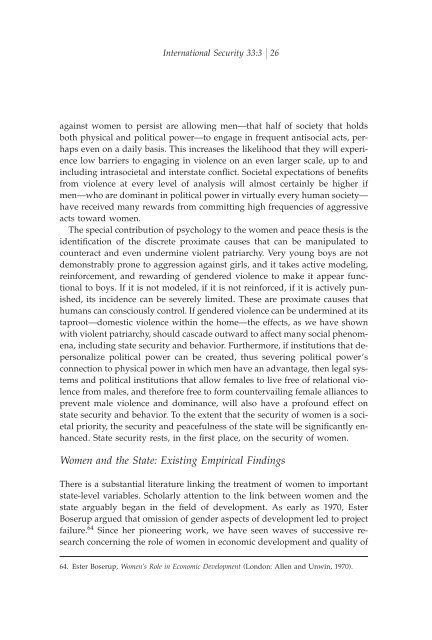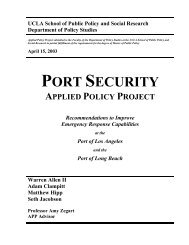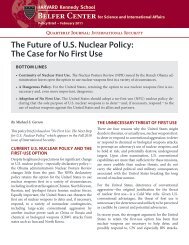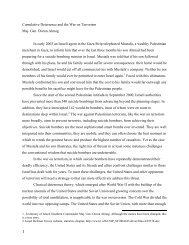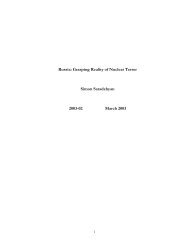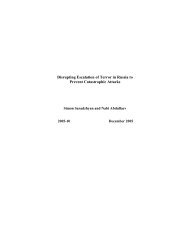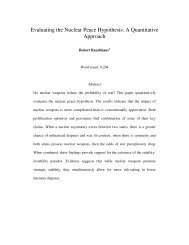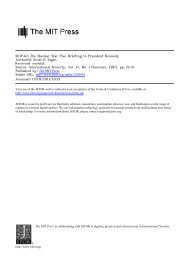The Heart of the Matter Valerie M. Hudson, - MIT Press Journals
The Heart of the Matter Valerie M. Hudson, - MIT Press Journals
The Heart of the Matter Valerie M. Hudson, - MIT Press Journals
Create successful ePaper yourself
Turn your PDF publications into a flip-book with our unique Google optimized e-Paper software.
International Security 33:3 26<br />
against women to persist are allowing men—that half <strong>of</strong> society that holds<br />
both physical and political power—to engage in frequent antisocial acts, perhaps<br />
even on a daily basis. This increases <strong>the</strong> likelihood that <strong>the</strong>y will experience<br />
low barriers to engaging in violence on an even larger scale, up to and<br />
including intrasocietal and interstate conºict. Societal expectations <strong>of</strong> beneªts<br />
from violence at every level <strong>of</strong> analysis will almost certainly be higher if<br />
men—who are dominant in political power in virtually every human society—<br />
have received many rewards from committing high frequencies <strong>of</strong> aggressive<br />
acts toward women.<br />
<strong>The</strong> special contribution <strong>of</strong> psychology to <strong>the</strong> women and peace <strong>the</strong>sis is <strong>the</strong><br />
identiªcation <strong>of</strong> <strong>the</strong> discrete proximate causes that can be manipulated to<br />
counteract and even undermine violent patriarchy. Very young boys are not<br />
demonstrably prone to aggression against girls, and it takes active modeling,<br />
reinforcement, and rewarding <strong>of</strong> gendered violence to make it appear functional<br />
to boys. If it is not modeled, if it is not reinforced, if it is actively punished,<br />
its incidence can be severely limited. <strong>The</strong>se are proximate causes that<br />
humans can consciously control. If gendered violence can be undermined at its<br />
taproot—domestic violence within <strong>the</strong> home—<strong>the</strong> effects, as we have shown<br />
with violent patriarchy, should cascade outward to affect many social phenomena,<br />
including state security and behavior. Fur<strong>the</strong>rmore, if institutions that depersonalize<br />
political power can be created, thus severing political power’s<br />
connection to physical power in which men have an advantage, <strong>the</strong>n legal systems<br />
and political institutions that allow females to live free <strong>of</strong> relational violence<br />
from males, and <strong>the</strong>refore free to form countervailing female alliances to<br />
prevent male violence and dominance, will also have a pr<strong>of</strong>ound effect on<br />
state security and behavior. To <strong>the</strong> extent that <strong>the</strong> security <strong>of</strong> women is a societal<br />
priority, <strong>the</strong> security and peacefulness <strong>of</strong> <strong>the</strong> state will be signiªcantly enhanced.<br />
State security rests, in <strong>the</strong> ªrst place, on <strong>the</strong> security <strong>of</strong> women.<br />
Women and <strong>the</strong> State: Existing Empirical Findings<br />
<strong>The</strong>re is a substantial literature linking <strong>the</strong> treatment <strong>of</strong> women to important<br />
state-level variables. Scholarly attention to <strong>the</strong> link between women and <strong>the</strong><br />
state arguably began in <strong>the</strong> ªeld <strong>of</strong> development. As early as 1970, Ester<br />
Boserup argued that omission <strong>of</strong> gender aspects <strong>of</strong> development led to project<br />
failure. 64 Since her pioneering work, we have seen waves <strong>of</strong> successive research<br />
concerning <strong>the</strong> role <strong>of</strong> women in economic development and quality <strong>of</strong><br />
64. Ester Boserup, Women’s Role in Economic Development (London: Allen and Unwin, 1970).


